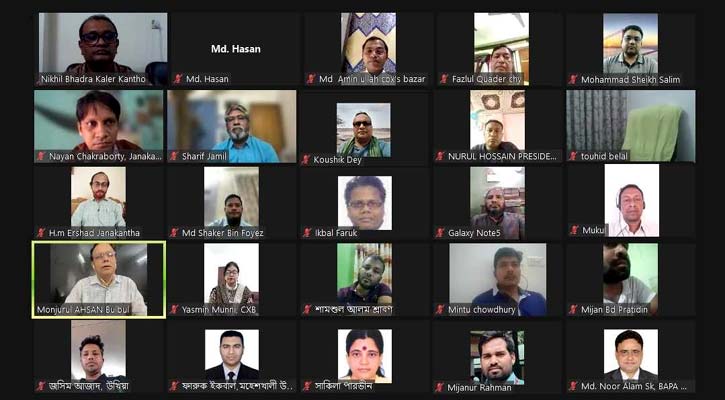Dhaka: Environmentalists and experts believe that investigative journalism plays a crucial role in safeguarding the lives, livelihoods, and the environment in coastal areas.
They suggest that investigative journalism can accurately depict issues such as river and waterway encroachment and pollution, as well as the destruction of hills and forests. Through such reporting, government and non-governmental entities can take proactive steps to address these concerns. Simultaneously, it can raise public awareness and consciousness about these issues.
On Monday (September 4th), during the inauguration ceremony of a two-day online workshop on “Environment and Coastal,” organized by Waterkeepers Bangladesh and Sundarbans and Environmental Protection Movement, coordinator of the Sundarbans and Coastal Protection Movement, Nikhil Chandra Bhadra, highlighted the importance of investigative journalism.
Journalist Manjurul Ahsan Bulbul, a prominent figure in the field, emphasized that investigative journalism is the lifeblood of journalism. It can help journalists uncover and present the true picture of environmental issues, including river encroachment, pollution, and the destruction of hills and forests, to the public. He stressed that journalists should delve deep into events to provide new information and present it to the public.
He further added that life and livelihood in coastal areas are always at risk, making journalists responsible for the protection of both the environment and the diverse life forms in these regions. Journalists have an essential role to play in raising public awareness about issues related to the protection of nature and life in these coastal areas.
Sharif Jamil, a leader of the Environmental Movement, expressed concerns that environmental degradation is leading the country towards a human-made catastrophe. He argued that fighting nature is futile, and by encroaching upon rivers, waterways, and causing pollution, we are essentially starting a battle against nature. Unauthorized industrialization is also threatening the biodiversity and environment in the coastal regions. Therefore, journalists must prioritize reporting on issues related to the coastal areas, seas, hills, and the Sundarbans to create awareness and support initiatives for protecting them.
Bapa leader Nur Alam Sheikh pointed out that the misuse of government resources, power, and assets is causing environmental destruction. He emphasized the need to halt illegal construction in Cox’s Bazar and to quickly implement the High Court’s directive to free the Bakkhali and Kohelia rivers from encroachment.
Fazlul Kader Chowdhury, journalist and former president of the Bangladesh Federal Union of Journalists (BFUJ), stated that environmental issues should be given more prominence. He stressed the importance of investigative journalism workshops and training for journalists in coastal districts and upazilas (sub-districts).
The workshop included the participation of 32 journalists from Chittagong and Cox’s Bazar. Previously, 31 journalists from the Khulna region and 27 journalists from the Barisal region attended similar workshops in their respective areas.

